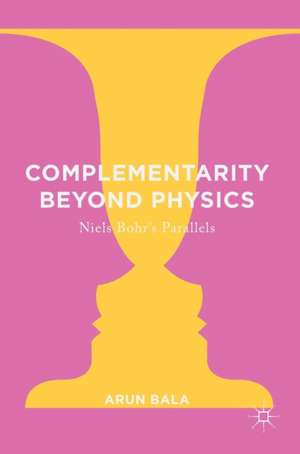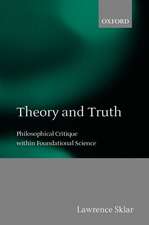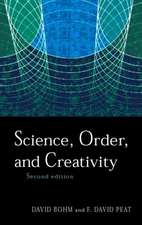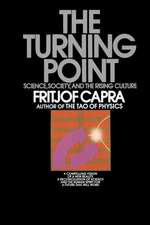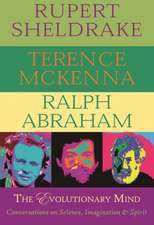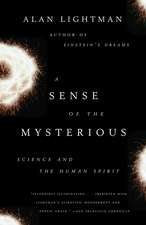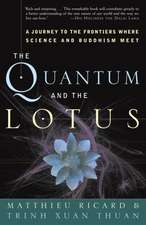Complementarity Beyond Physics: Niels Bohr's Parallels
Autor Arun Balaen Limba Engleză Hardback – 15 dec 2016
In this study Arun Bala examines the implications that Niels Bohr’s principle of complementarity holds for fields beyond physics. Bohr, one of the founding figures of modern quantum physics, argued that the principle of complementarity he proposed for understanding atomic processes has parallels in psychology, biology, and social science, as well as in Buddhist and Taoist thought. But Bohr failed to offer any explanation for why complementarity might extend beyond physics, and his claims have been widely rejected by scientists as empty speculation. Scientific scepticism has only been reinforced by the naïve enthusiasm of postmodern relativists and New Age intuitionists, who seize upon Bohr’s ideas to justify anti-realist and mystical positions.
Arun Bala offers a detailed defence of Bohr’s claim that complementarity has far-reaching implications for the biological and social sciences, as well as for comparative philosophies of science, by explaining Bohr’s parallels as responses to the omnipresence of grown properties in nature.
| Toate formatele și edițiile | Preț | Express |
|---|---|---|
| Paperback (1) | 637.46 lei 6-8 săpt. | |
| Springer International Publishing – 28 apr 2018 | 637.46 lei 6-8 săpt. | |
| Hardback (1) | 644.18 lei 6-8 săpt. | |
| Springer International Publishing – 15 dec 2016 | 644.18 lei 6-8 săpt. |
Preț: 644.18 lei
Preț vechi: 757.85 lei
-15% Nou
Puncte Express: 966
Preț estimativ în valută:
123.28€ • 127.35$ • 102.60£
123.28€ • 127.35$ • 102.60£
Carte tipărită la comandă
Livrare economică 25 martie-08 aprilie
Preluare comenzi: 021 569.72.76
Specificații
ISBN-13: 9783319397832
ISBN-10: 3319397834
Pagini: 281
Ilustrații: IX, 269 p. 2 illus.
Dimensiuni: 148 x 210 x 2 mm
Greutate: 0.52 kg
Ediția:1st ed. 2017
Editura: Springer International Publishing
Colecția Palgrave Macmillan
Locul publicării:Cham, Switzerland
ISBN-10: 3319397834
Pagini: 281
Ilustrații: IX, 269 p. 2 illus.
Dimensiuni: 148 x 210 x 2 mm
Greutate: 0.52 kg
Ediția:1st ed. 2017
Editura: Springer International Publishing
Colecția Palgrave Macmillan
Locul publicării:Cham, Switzerland
Cuprins
1. Complementarity Beyond Physics.- 2. Biological Complementarity of the Molecular and Functional.- 3. Psychological Complementarity of Spectator and Actor.- 4. Anthropological Complementarity of the Natural and Cultural.- 5. Complementarity and Unity of Knowledge.
Notă biografică
Arun Bala is a physicist and philosopher of science. He is the author of The Dialogue of Civilizations in the Birth of Modern Science, the editor of Asia, Europe and the Emergence of Modern Science, and co-editor of The Bright Dark Ages: Comparative and Connective Perspectives. He has held teaching and visiting positions at the National University of Singapore as well as the University of Toronto, Western University, and Dalhousie University, Canada.
Textul de pe ultima copertă
In this study Arun Bala examines the implications that Niels Bohr’s principle of complementarity holds for fields beyond physics. Bohr, one of the founding figures of modern quantum physics, argued that the principle of complementarity he proposed for understanding atomic processes has parallels in psychology, biology, and social science, as well as in Buddhist and Taoist thought. But Bohr failed to offer any explanation for why complementarity might extend beyond physics, and his claims have been widely rejected by scientists as empty speculation. Scientific scepticism has only been reinforced by the naïve enthusiasm of postmodern relativists and New Age intuitionists, who seize upon Bohr’s ideas to justify anti-realist and mystical positions.
Arun Bala offers a detailed defence of Bohr’s claim that complementarity has far-reaching implications for the biological and social sciences, as well as for comparative philosophies of science, by explaining Bohr’s parallels as responses to the omnipresence of grown properties in nature.
Caracteristici
Rehabilitate certain ideas of Niels Bohr, by discussing how Bohr’s principle of complementarity has implications well beyond quantum theory Investigates how Niels Bohr's notion of complementarity can illuminate traditional Chinese philosophy as well as shed light on some notions and problems of Buddhist epistemology Uses a defense of Niels Bohr's parallels to outline a new approach to comparative science studies
